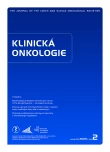-
Medical journals
- Career
Bevacizumab in combination with capecitabine and irinotecan (XELIRi) in treatment of metastatic colorectal cancer
Authors: I. Kocáková; I. Kocák; M. Svoboda; R. Němeček; Z. Řehák; M. Standara
Authors‘ workplace: Masarykův onkologický ústav, Brno
Published in: Klin Onkol 2009; 22(2): 73-76
Category: Case Reports
Overview
Backgrounds:
Incidence and mortality rates of colorectal malignancies in the Czech Republic are one of the highest in the world since over 7,500 patients are diagnosed yearly. About 25% of patients are diagnosed in clinical stage IV and in average more than 50% of patients who are diagnosed initially with resectable disease will relapse sooner or later. Management of palliative treatment of colorectal cancer therefore is becoming of a great importance.Observation:
We designed a study protocol in 2005 and 16 patients with metastatic colorectal cancer were treated accordingly in the first line setting with XELIRI regimen (capecitabin, irinotecan) + bevacizumab. The regimen has proven high antitumor effectiveness (78% responses to treatment, median TTP: 12 months, 1-year survival reached 100% of patients) and excellent tolerance. No serious grade G3 or G4 toxicity was observed. Increase of blood pressure was observed sporadically within the group. We present below the case of 55 year old patient who underwent treatment of 4 cycles of XELIRI + bevacizumab and reached complete remission of the disease which lasted over the next 9 months (TTP 13 months).Conclusion:
Successful choice of a regimen of the first line treatment determines the next course of a disease including duration of patient’s overall survival. We have confirmed within our pivotal population that combination treatment XELIRI + bevacizumab is a very effective and well tolerated regimen moreover suitable for administration at outpatient setting.Key words:
colorectal cancer – chemotherapy – targeted therapy – bevacizumab – irinotecan – capecitabine
Sources
1. Dušek L, Mužík J, Kubásek M et al. Epidemiologie zhoubných nádorů v České republice [online]. Masarykova univerzita 2005, cit. 2009-3-22. Dostupné z http://www.svod.cz. Verze 7.0 [2007]. ISSN 1802-8861.
2. Hegde SR, Sun W, Lynch JP. Systemic and targeted therapy for advanced colon cancer. Expert Rev Gastroenterol Hepatol 2008; 2(1): 135–149.
3. Presta LG, Chen H, O’Connor SJ et al. Humanization of an anti vascular endothelial growth factor monoclonal antibody for the therapy of solid tumors and other disorders. Cancer Res 1997; 57 : 4593–4599.
4. Fuchs CS, Marshall J, Mitchell E et al. Randomized, controlled trial of irinotecan plus infusional, bolus, or oral fluoropyrimidines in first line treatment of metastatic colorectal cancer: results from the BICC-C Study. J Clin Oncol 2007; 25(30): 4779–4786.
5. Chase JL. Clinical use of anti vascular endothelial growth factor monoclonal antibodies in metastatic colorectal cancer. Pharmacotherapy 2008; 28(11 Pt 2): 23S–30S.
6. Hurwitz H, Fehrenbacher L, Novotny W et al. Bevacizumab plus irinotecan, fluorouracil, and leucovorin for metastatic colorectal cancer. N Engl J Med 2004; 350(23): 2335–2342.
7. Kocakova I, Spelda S, Kocak I et al. Phase I/II study of capecitabine plus irinotecan (XELIRI) in combination with bevacizumab as first line therapy in metastatic colorectal cancer. American Society of Clinical Oncology Annual Meeting 2006. Proceeding Book, poster No. 13540.
Labels
Paediatric clinical oncology Surgery Clinical oncology
Article was published inClinical Oncology

2009 Issue 2-
All articles in this issue
- Trastuzumab in the breast cancer treatment: efficacy and resistance mechanisms
- Clinical relevance of chromosomal aberrations in bone and soft tissue tumors in children and young adults
- The preparation of anticancer vaccine for patients with multiple myeloma on the base of monoclonal immunoglobulin loaded dendritic cells
- Bevacizumab in combination with capecitabine and irinotecan (XELIRi) in treatment of metastatic colorectal cancer
- Long term survivors of childhood cancer: Cure and care. The ERICE statement.
- Epidemiological features of testicular cancer in the Slovak Republic – retrospective study
- Clinical Oncology
- Journal archive
- Current issue
- Online only
- About the journal
Most read in this issue- The preparation of anticancer vaccine for patients with multiple myeloma on the base of monoclonal immunoglobulin loaded dendritic cells
- Trastuzumab in the breast cancer treatment: efficacy and resistance mechanisms
- Clinical relevance of chromosomal aberrations in bone and soft tissue tumors in children and young adults
- Long term survivors of childhood cancer: Cure and care. The ERICE statement.
Login#ADS_BOTTOM_SCRIPTS#Forgotten passwordEnter the email address that you registered with. We will send you instructions on how to set a new password.
- Career

